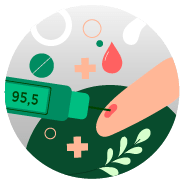Overview
- Type 2 diabetes is a chronic medical condition that affects millions of people in the USA. Untreated diabetes may cause blindness, kidney failure, heart disease, and other health conditions.
- Up to 37% of people with untreated prediabetes develop type 2 diabetes within four years.
- Maintaining portion sizes may help reduce blood sugar levels and decreases diabetes risk.
- Modest weight loss may lessen your risk of diabetes, particularly if you have excess abdominal weight.
- In the case of pre-gestational or gestational diabetes, you’ll need special monitoring to prevent complications.


There are two major types of diabetes:
- Type 1 diabetes
- Type 2 diabetes
In type 1 diabetes, the immune system attacks the pancreas and destroys the cells that make insulin.
In type 2 diabetes, the pancreas makes insulin, but the body doesn't respond to it properly.
In both types of diabetes, glucose can't get into cells. It causes a rise in blood sugar levels that makes a person sick if left untreated.
How to prevent type 1 diabetes?
Type 1 diabetes can't be prevented. Healthcare providers can't even tell who will get it and who won't. There are no exact causes of type 1 diabetes, but researchers think it has a link with genes. But, genes are not enough reason to have type 1 diabetes.
Type 1 diabetes isn't contagious. That's why children and teens can't have it from other people or pass it along to their family members. Also, excessive use of sugar doesn’t cause type 1 diabetes.
There is no consistent source to know who will have type 1 diabetes, but a blood test can help find early signs. These tests aren't conducted regularly, because healthcare providers don't have any way to prevent a child from developing the disease.
How to prevent type 2 diabetes?
The most common type of disease, type 2 diabetes can be prevented with lifestyle changes. Prevention is important if you're at a higher risk of type 2 diabetes due to excessive weight gain, obesity, high cholesterol, or a family history of diabetes.
If you’re suffering from prediabetes and high blood sugar that doesn't reach the threshold of a diabetes diagnosis, lifestyle changes can help delay the onset of the disease. Making changes in lifestyle can help you avoid serious health conditions; kidney failure, heart problem, and nerve damage.
- Lose excessive weight
Weight loss reduces the risk of diabetes. Many people reduced their risk of developing diabetes by approximately 60% after losing almost 7% of their body weight by changing diet and exercise routine, according to a study.
The American Diabetes Association recommends that people who have been diagnosed with prediabetes reduce at least 7% to 10% weight to prevent progression.
To change your lifestyle, you can set a weight loss goal as per your current body weight. Consult your healthcare provider about short-term goals and expectations, such as reducing 1 to 2 pounds per week.
- Be more physically active
There are plenty of benefits of regular physical activity. When you exercise five times a week, you can lose weight, lower blood sugar, and boost your sensitivity to insulin. Adults can maintain healthy body weight by making the following changes in their lifestyle:
- Aerobic exercise
There are plenty of benefits of regular physical activity. When you exercise five times a week, you can lose weight, lower blood sugar, and boost your sensitivity to insulin. Adults can maintain healthy body weight by making the following changes in their lifestyle:
- Resistance activity
Resistance exercises, such as weight lifting, yoga, and calisthenics 2 to 3 times a week increase your strength and ability to maintain a healthy lifestyle.
- Aerobic exercise
- Eat fiber-rich foods
Plants are a great source of minerals, vitamins, and carbohydrates in your diet. Carbohydrates include sugars, fiber, and starches. Fiber-rich foods help lose weight and decrease the risk of diabetes. You can add a variety of high fiber foods to your diet, such as:
Fiber-Rich Foods Sources Fruits Tomatoes, peppers, and fruit from trees Non-starchy vegetables Broccoli, cauliflower, and leafy greens Legumes Chickpeas, lentils, and beans Whole grains Whole-wheat pasta and bread, whole-grain rice, whole oats, and quinoa Fiber can also help in:
- Slowing the absorption of sugars and reducing blood sugar levels
- Managing risk factors that affect heart health, such as blood pressure and inflammation
- Controlling diet because fiber-rich foods are more filling
- Absorption of dietary fat and cholesterol
- Eat healthy plant foods
Fatty foods are rich in calories, and you should eat them in moderation. Your diet should include foods with unsaturated fats, called good fats, to reduce weight. These promote healthy blood cholesterol levels and vascular health. Good fats sources are:
Unsaturated Fats Sources Oils Olive, sunflower, safflower, cottonseed, and canola Nuts and seeds Almonds, peanuts, flaxseed, pumpkin seeds Fatty fish Salmon, mackerel, sardines, tuna, and cod Saturated foods, the "bad fats," are extant in dairy products and meats. You should add their small portion to your diet. You can also limit bad fats by eating low-fat dairy products, lean chicken, and pork.
- Skip fad diet
Fad diets, such as glycemic index, paleo, or keto - can help you lose weight and prevent diabetes. Your dietary goal should be to reduce weight and maintain it more healthily.
Healthy dietary decisions need to include an approach that you can continue as a lifelong habit. One simple strategy to help you make good food choices and eat appropriate portions is dividing your plate into sections. These three sections promote healthy eating habits:
- One half: fruits and non-starchy vegetables
- One quarter: whole grains
- One quarter: protein-rich foods
When to see your doctor?
The American Diabetes Association suggests diagnostics tests with routine screening for adults over 45 or older and for the following groups:
- People younger than 45 who are overweight and have higher risk factors that trigger diabetes
- Women who have had gestational diabetes
- People with prediabetes
- Children who are overweight and have a family history of type 2 diabetes
You can discuss your concerns about diabetes prevention with your healthcare provider. They will guide you to prevent diabetes and may give recommendations based on your medical history or other factors.
Type 2 diabetes in children is on the rise. If your child has been diagnosed with diabetes, implementing prevention tips recommended by a doctor can be helpful. You can get more active together, offer your child nutritious snacks, and limit their screen time to prevent diabetes.
Drinking water may help control blood sugars and insulin levels and reduces the risk of diabetes. It helps avoid beverages rich in sugar and preservatives with unhealthy ingredients.
Because type 2 diabetes is a life-threatening health condition that can lead to heart disease, stroke, and blindness. When you prevent or delay developing type 2 diabetes, you can decrease your risk for all life-threatening medical conditions.
Yes! Type 2 diabetes can prevent or delay with proven, achievable lifestyle changes. These changes can be losing weight, getting more physically active, following a high-fiber diet, and controlling your portion size.
Diabetic ketoacidosis (DKA) is a severe complication of diabetes and can be life-threatening. It occurs when you don't have enough insulin levels to let blood sugar into your cells. Low insulin levels and high blood sugar level causes DKA. Illness and missing insulin shots are the most common causes. In such a situation, see your doctor and know how to prevent and treat DKA.
Join Our Newsletter Now
Subscribe to get information about Omni Help
